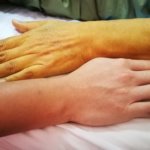
Current research has shown that children who experience emotional trauma may have an effect on whether certain types of physical and mental diseases are experienced during adulthood. Adverse childhood experiences (ACEs) may include, divorce, loss of a parent, emotional neglect, physical neglect, parental abandonment, living with a mentally ill or addicted family member, and verbal humiliation.
All of these adverse childhood experiences can harm the developing brain and this may predispose the child to heart disease, autoimmune disease, depression, cancer, and many other chronic conditions long after the trauma occurred, sometimes even decades after the experience.
If you have suffered from adverse childhood experiences, there are some mental and physical health symptoms that you may suffer from as a result. These may also be the result of simple genetics or other factors.
Here are 8 signs or symptoms that are often related to adverse childhood experiences.
1. Mental Health Indicators
There has been a link found between those who have a high ACE-Q score and emotional distress, relationship problems, work performance, financial issues, high levels of stress, the inability to control anger, and current familial issues. Adverse childhood experiences such as abuse, dysfunction in the household and indicators of worker performance of an impaired adult all can lead to many of these mental health issues as an adult.
Overall, a person who has suffered from any type of adverse childhood experience may end up with several mental health issues that can be impacting their day to day life. These are the result of the experience and without help can often be difficult to overcome. In fact, many people do not realize that these mental health issues can be treated and are very relatable.
Knowing that there is a problem is often the first step in overcoming this type of mental health disorder that has been caused by the trauma during childhood.


